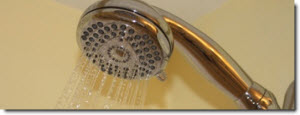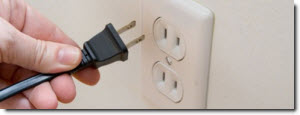What You Can Do: In Your Home
Quick tips
- Choose phosphate-free soaps and detergents.
- Pick up after your pet.
- Use water efficiently.
- Wash your car on your lawn or in commercial car washes.
On this page:
- Cleaning Supplies-Detergents and Soaps
- Pet waste
- Septic Systems
- Water Efficiency
- Energy Efficiency
- Vehicles
Cleaning Supplies-Detergents and Soaps
- Choose phosphate-free detergents, soaps, and household cleaners.
- Select the proper load size for your washing machine.
- Only run your clothes or dish washer when you have a full load.
- Use the appropriate amount of detergent; more is not better.
Pet Waste
- Always pick up after your pet.
- Avoid walking your pet near streams and other waterways. Instead, walk them in grassy areas, parks or undeveloped areas.
- Inform other pet owners of why picking up pet waste is important and encourage them to do so.
- Take part in a storm drain marking program in your area to help make others aware of where pet waste and other runoff goes when not disposed of properly.
Septic Systems
- Inspect your septic system annually.
- Pump out your septic system regularly. (Pumping out every two to five years is recommended for a three-bedroom house with a 1,000-gallon tank; smaller tanks should be pumped more often).
- Do not use septic system additives. There is no scientific evidence that biological and chemical additives aid or accelerate decomposition in septic tanks; some additives can in fact be detrimental to the septic system or contaminate ground water.
- Do not divert storm drains or basement pumps into septic systems.
- Avoid or reduce the use of your garbage disposal. Garbage disposals contribute unnecessary solids to your septic system and can also increase the frequency your tank needs to be pumped.
- Don't use toilets as trash cans. Excess solids can clog your drainfield and necessitate more frequent pumping.
- When installing a septic system, maintain a safe distance from drinking water sources to avoid potential contamination. Avoid areas with high water tables and shallow impermeable layers.
- Plant only grass in the drain field and avoid planting trees, bushes, or other plants with extensive root systems that could damage the system's tank or pipes.
- Visit EPA's Septic Smart website to learn more about how your septic system works and simple tips on how to properly maintain it. You can also find resources to launch a local septic education campaign.
Water Efficiency

Devices like low-flow showerheads can reduce the volume of wastewater discharged to home septic systems and sewage treatment plants.
- Choose WaterSense labeled products which are high performing, water efficient appliances.
- Use low-flow faucets, shower heads, reduced-flow toilet flushing equipment, and water-saving appliances such as dish- and clothes washers.
- Repair leaking faucets, toilets and pumps.
- Take short showers instead of baths and avoid letting faucets run unnecessarily.
Energy Efficiency

Using less electricity at home can reduce emissions of nitrogen pollution from energy production.
- Turn things off or unplug them when you're not using them.
- Adjust the thermostat by a few degrees to be slightly warmer in the summer and cooler in the winter.
- Replace old light bulbs with new energy efficient bulbs.
- Use a power strip to turn on and off electronic devices.
- Open shades to utilize daylight instead of turning on lights; on cool days this helps to keep rooms warmer.
- In the summer, close shades when not in the room to keep rooms cooler and use less electricity.
- Hang-dry clothes instead of using the dryer.
- Find out if it is possible to switch to wind generated energy.
- Check out EPA's Energy Star homepage for more tips on how to reduce your electricity use
Vehicles
Washing Your Car
- Use a commercial car wash; commercial car washes are required to properly dispose of wastewater and many filter and recycle their water.
- If washing your car at home consider the following actions:
- Wash your car on a pervious surface such as grass or gravel (not concrete or asphalt) so water is filtered before reaching a water body.
- Use nontoxic, phosphate-free soaps.
- Use soap sparingly.
- Minimize runoff by reducing water use, using a spray nozzle to restrict water flow.
- Wring out sponges and rags over the bucket or in a sink, not the ground.
- Empty wash water into the sink or toilet, or the grass if you wish to dispose of it outside.
- Use waterless car wash products for spot-cleaning or a car wash kit, which redirects water from storm drains.
- When conducting car wash fundraisers use a car wash kit; many cities will lend kits free of charge to groups conducting car washes for fundraising, or you can buy car wash kits.
Driving
- Plan out your errands for one trip so you can reduce the amount of time you have to drive.
- Carpool with friends or coworkers.
- Take public transportation.
- Consider alternative means of travel, such as biking or walking whenever practical.
- Telecommute from home.
- Choose for flex fuel, diesel, hybrid, compact, or other fuel-efficient vehicles.
- Get better gas mileage:
- Routinely checking tire pressure.
- Avoid using the air conditioning during city driving.
- Be light on the gas by using smooth acceleration and deceleration and maintain a constant speed.
- Regularly service and perform maintenance on your car.
- Avoid driving with extra weight in the car; transport only necessary items.
